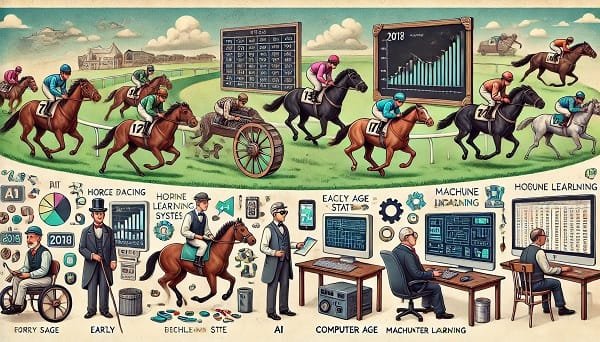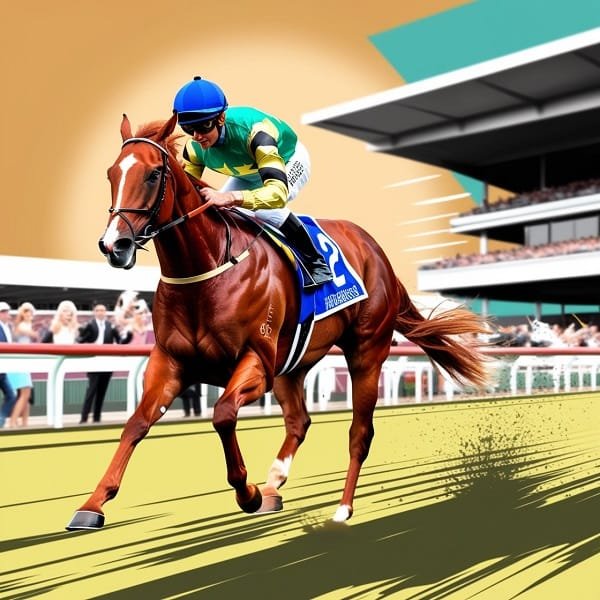Beginners’ Guide to Betting on Handicap Races: Level the Playing Field and Win Big If…

The History and Evolution of Horse Racing Systems: How Betting Got Smart
Alright, horse racing fans – today, we’re diving into the wild and winding history of horse racing systems. Yep, that’s right, we’re talking about the “secret sauces” people have used over the years to (hopefully) win big on the horses. Betting on horses has been around for centuries, and so have the clever methods for trying to beat the odds. Let’s jump on this time-travelling horse and take a look at how horse racing systems evolved from sheer guesswork to sophisticated strategies. Buckle up; it’s going to be a fun ride!
—
The Early Days: Betting on Luck and Gut Feelings
Imagine it’s the 1600s. There’s no internet, no fancy track conditions report, and definitely no form guides. Back then, people would gather at local race meets and bet on horses purely by gut feeling. They’d pick a horse based on its name, colour, or how loudly the jockey shouted (we’re guessing here). Betting was less about strategy and more about *vibes*. And while some of those early punters probably got lucky, there wasn’t much rhyme or reason to their picks.
But here’s the thing: people back then were just as eager to win as we are now, so it wasn’t long before folks started thinking, “Hey, there’s gotta be a smarter way to do this…”
—
Enter the 1800s: Birth of the “Form Guide”
By the 1800s, horse racing had really started to take off, especially in the UK. Racing was getting more organised, and people began tracking things like a horse’s past performance, jockey skill, and even the track’s condition. The Form Guide was born – a little booklet packed with information to help people make more educated bets.
The first form guides were simple, but they were a *game changer*. Now, instead of betting purely on instinct, punters could look at cold, hard data to make their choices. This was the dawn of the “smart bet,” and it sparked a new wave of betting strategies. People were starting to see patterns and trends, and soon, everyone was trying to find their edge.
—
The 1900s: Mathematical Systems and the Rise of Probability
Fast forward to the 20th century, and betting systems were getting serious. This was when math really entered the picture. You had people applying probability theory to try and predict winners, calculating odds like it was rocket science (and, in some cases, it was). A few popular systems emerged, like the Martingale System, where you’d double your bet every time you lost, hoping for a win to recoup your losses. Risky? Yes. Popular? Also yes.
Then came handicapping systems – methods to rank horses based on factors like weight, track condition, jockey experience, and more. People were using more sophisticated data to pick horses, and while there were no guarantees, it certainly felt more like science than luck. Horse racing systems were evolving fast, and people loved it.
—
The 1960s: The Computer Age Begins
Here’s where things get really interesting: computers entered the game. In the 1960s, betting experts and mathematicians started using computers to crunch numbers that were simply too big for the human brain. Suddenly, systems could analyse vast amounts of race data in seconds. It was like the dawn of the *super-powered betting system*.
One of the most famous names from this era was Dr. William Benter, who developed one of the first successful computer-based systems. Using sophisticated algorithms, Benter and his team could analyse thousands of variables at once, predicting winners with surprising accuracy. This wasn’t just a guy with a lucky charm – it was data-driven, next-level betting. And it worked! His system reportedly made millions, proving that technology was now a major player in the world of horse racing.
—
The 1990s to Early 2000s: The Internet Boom
The 90s brought us the internet, and the world of horse racing betting would never be the same. Now, anyone could access real-time data from their living room, and online bookmakers began offering a whole range of betting options. Suddenly, betting systems weren’t just for insiders with access to expensive data – they were for everyone with an internet connection.
This was when betting forums and communities started popping up, with people sharing tips and systems that actually worked. The internet made information about horses, trainers, and track conditions widely available, and amateur bettors started creating their own strategies. Betting systems became more accessible, and it wasn’t just about who had the most knowledge anymore; it was about who could use that knowledge best.
—
Today: Machine Learning, AI, and the Rise of the Super System
And that brings us to today, where technology has taken horse racing systems to a whole new level. Machine learning and artificial intelligence (AI) are now the stars of the show. These systems can analyse insane amounts of data from previous races, track conditions, horse physiology, and even social media chatter. Yes, really – some systems analyse *tweets* to gauge public sentiment and adjust their picks accordingly.
AI-powered betting systems are constantly learning and adapting, getting smarter with each race. It’s like having a supercomputer with a sixth sense, processing millions of pieces of data to predict outcomes. For example, a betting system might look at a horse’s race history, combine it with the trainer’s past performance on similar tracks, throw in a weather analysis, and predict the odds with incredible accuracy.
Even regular bettors can now access apps and software that use complex algorithms to offer betting advice. With all this tech, the playing field has become more even, and systems that were once the playground of professional gamblers are now available to the everyday punter.
—
What’s Next? Quantum Computing?
Who knows what the future holds? With technology advancing faster than ever, it’s not too far-fetched to imagine a day where quantum computers start making race predictions, calculating odds at speeds we can barely comprehend. The future of horse racing betting might be even more high-tech, with personalised systems designed to fit individual betting styles and preferences. Imagine a system that learns *your* patterns, giving you personalised advice – it could happen!
—
So, What Does It All Mean for You?
Today, anyone can dive into the world of horse racing betting systems, whether they’re using a basic form guide or a fancy AI app. There are systems for every level of risk, budget, and experience. So next time you place a bet, remember you’re part of a long, exciting history of bettors who’ve been trying to crack the code for centuries. And who knows – maybe you’ll come up with your own winning system one day!
Happy betting and may the odds (and the data) be ever in your favour!







